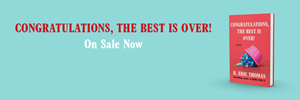Navigating Life's Crossroads: The Journey of Reinvention
March 1, 2025, 10:47 pm
Life is a series of crossroads. Each turn presents choices that can shape our future. For many, these decisions come at pivotal moments, often accompanied by grief, uncertainty, or overwhelming responsibilities. Two recent letters to an advice column highlight this struggle, revealing the complexities of life after loss and the burdens of modern living.
In the first letter, a 73-year-old widower grapples with the aftermath of his wife’s death. Three years have passed, yet the shadows of grief linger. He stands at a financial crossroads, poised to inherit a significant sum. Should he upgrade his lifestyle? Buy a nicer home? Or perhaps consider assisted living? The questions swirl like leaves in the wind. He is alone but not lonely, surrounded by a supportive group of friends. Yet, he hesitates to lean on them for guidance.
This scenario is a poignant reminder of the emotional weight that accompanies loss. The widow’s journey is not just about financial decisions; it’s about rediscovering purpose. He seeks to travel, to explore the world anew. But the fear of the unknown looms large. Should he embrace a nomadic lifestyle at his age? The desire for adventure clashes with the practicality of his situation.
The advice given emphasizes the importance of taking time. Life is not a race. Decisions can be made slowly, like a painter choosing colors for a canvas. The next chapter can unfold gradually, one brushstroke at a time. Seeking professional advice from financial planners and estate managers is a wise step. They can help navigate the complexities of inheritance and investment. But beyond the numbers, it’s about finding joy again.
In the second letter, a woman in her late 40s finds herself overwhelmed. She juggles a demanding job, a tween daughter, and the emotional needs of her family. The weight of responsibility is heavy. Decision fatigue has set in, leaving her drained. She questions whether this is a mid-life crisis or simply the result of too many demands.
Her situation reflects a common struggle in today’s fast-paced world. The pressure to perform, to be everything to everyone, can lead to burnout. The advice given is simple yet profound: acknowledge the burden. It’s okay to admit when life feels too heavy. This act of recognition can be liberating.
Mindfulness and meditation are suggested as tools for reclaiming peace. Just five minutes a day can create a sanctuary amidst chaos. It’s a reminder that self-care is not selfish; it’s essential. By prioritizing her well-being, she can better support those around her.
Both letters reveal a universal truth: life is a balancing act. Whether facing the aftermath of loss or the demands of daily life, the need for support is crucial. Friends and family can serve as anchors, providing comfort and perspective. Yet, many hesitate to reach out, fearing they might burden others. This reluctance can lead to isolation, compounding the challenges faced.
In the case of the widower, he has a network of friends but feels reluctant to ask for help. This is a common theme. People often feel they must navigate their struggles alone. But vulnerability can be a strength. Sharing one’s burdens can foster deeper connections and provide unexpected support.
For the overwhelmed woman, the challenge lies in managing expectations. She must learn to set boundaries, to say no when necessary. It’s a skill that many struggle to master. The fear of disappointing others can be paralyzing. Yet, prioritizing personal well-being is not a sign of weakness; it’s a step toward resilience.
As we navigate our own crossroads, it’s essential to remember that life is not a straight path. It’s filled with twists and turns, ups and downs. Each decision, whether big or small, shapes our journey. Embracing change can be daunting, but it can also lead to growth and renewal.
In both cases, the individuals are at a turning point. The widower is faced with the challenge of redefining his life after loss. The woman must find a way to balance her many roles without losing herself. Both are on a quest for clarity and purpose.
The road ahead may be uncertain, but it is also filled with possibilities. For the widower, it could mean exploring new relationships or embarking on adventures. For the woman, it might involve carving out time for herself amidst the chaos.
Ultimately, life is about choices. It’s about taking the time to reflect, to seek advice, and to embrace the journey. Each step forward is a testament to resilience. Each decision is a brushstroke on the canvas of life.
As we stand at our own crossroads, let us remember to lean on others, to seek guidance, and to prioritize our well-being. Life is a beautiful, messy adventure. Embrace it.
In the first letter, a 73-year-old widower grapples with the aftermath of his wife’s death. Three years have passed, yet the shadows of grief linger. He stands at a financial crossroads, poised to inherit a significant sum. Should he upgrade his lifestyle? Buy a nicer home? Or perhaps consider assisted living? The questions swirl like leaves in the wind. He is alone but not lonely, surrounded by a supportive group of friends. Yet, he hesitates to lean on them for guidance.
This scenario is a poignant reminder of the emotional weight that accompanies loss. The widow’s journey is not just about financial decisions; it’s about rediscovering purpose. He seeks to travel, to explore the world anew. But the fear of the unknown looms large. Should he embrace a nomadic lifestyle at his age? The desire for adventure clashes with the practicality of his situation.
The advice given emphasizes the importance of taking time. Life is not a race. Decisions can be made slowly, like a painter choosing colors for a canvas. The next chapter can unfold gradually, one brushstroke at a time. Seeking professional advice from financial planners and estate managers is a wise step. They can help navigate the complexities of inheritance and investment. But beyond the numbers, it’s about finding joy again.
In the second letter, a woman in her late 40s finds herself overwhelmed. She juggles a demanding job, a tween daughter, and the emotional needs of her family. The weight of responsibility is heavy. Decision fatigue has set in, leaving her drained. She questions whether this is a mid-life crisis or simply the result of too many demands.
Her situation reflects a common struggle in today’s fast-paced world. The pressure to perform, to be everything to everyone, can lead to burnout. The advice given is simple yet profound: acknowledge the burden. It’s okay to admit when life feels too heavy. This act of recognition can be liberating.
Mindfulness and meditation are suggested as tools for reclaiming peace. Just five minutes a day can create a sanctuary amidst chaos. It’s a reminder that self-care is not selfish; it’s essential. By prioritizing her well-being, she can better support those around her.
Both letters reveal a universal truth: life is a balancing act. Whether facing the aftermath of loss or the demands of daily life, the need for support is crucial. Friends and family can serve as anchors, providing comfort and perspective. Yet, many hesitate to reach out, fearing they might burden others. This reluctance can lead to isolation, compounding the challenges faced.
In the case of the widower, he has a network of friends but feels reluctant to ask for help. This is a common theme. People often feel they must navigate their struggles alone. But vulnerability can be a strength. Sharing one’s burdens can foster deeper connections and provide unexpected support.
For the overwhelmed woman, the challenge lies in managing expectations. She must learn to set boundaries, to say no when necessary. It’s a skill that many struggle to master. The fear of disappointing others can be paralyzing. Yet, prioritizing personal well-being is not a sign of weakness; it’s a step toward resilience.
As we navigate our own crossroads, it’s essential to remember that life is not a straight path. It’s filled with twists and turns, ups and downs. Each decision, whether big or small, shapes our journey. Embracing change can be daunting, but it can also lead to growth and renewal.
In both cases, the individuals are at a turning point. The widower is faced with the challenge of redefining his life after loss. The woman must find a way to balance her many roles without losing herself. Both are on a quest for clarity and purpose.
The road ahead may be uncertain, but it is also filled with possibilities. For the widower, it could mean exploring new relationships or embarking on adventures. For the woman, it might involve carving out time for herself amidst the chaos.
Ultimately, life is about choices. It’s about taking the time to reflect, to seek advice, and to embrace the journey. Each step forward is a testament to resilience. Each decision is a brushstroke on the canvas of life.
As we stand at our own crossroads, let us remember to lean on others, to seek guidance, and to prioritize our well-being. Life is a beautiful, messy adventure. Embrace it.


